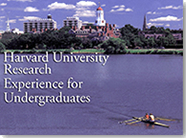REU Program Research Areas

Each student will be selected to work on a project that is funded through a specific source, outlined below. Please visit the links below for more information about the research and faculty involved with each center or institute. You do not need to apply for specific funding, but if you have a preference to work with a particular area or certain faculty funded by the centers or institutes listed, please note this in your research statement. Applicants are considered for all projects based on interest selected in the online application.
2026 Research Areas and Funding Sources
Contingent on continued funding.
- NSF Materials Research Science and Engineering Center (MRSEC) — The Harvard MRSEC's two interdisciplinary research groups (IRGs) seek to create new classes of soft functional materials and to provide new insights into the behavior of mechanically soft systems far from equilibrium. IRG I, which focuses on programmable multiscale and multi-material control of functional matter, is aimed at fundamental advances in materials synthesis, modeling, and 3D printing that enable the creation of functional soft materials that augment human performance. New classes of soft materials that sense, actuate, and communicate are being developed for use in wearables, haptic interfaces, and artificial muscles to enhance future work at the human-technology frontier. IRG II, with a focus on non-equilibrium phenomena in mechanically soft systems, is pursuing new insights into the behavior of mechanically soft systems that are subjected to perturbations far from equilibrium. By combining data-rich experiments, theory, and artificial intelligence, the research will contribute greatly to harnessing the data revolution to applications in soft materials.
- Privacy Tools Project and Open Differential Privacy — Join a multidisciplinary effort to help enable the collection, analysis and sharing of personal data for research in social science and other fields while providing privacy for individual subjects. Positions contingent on funding.
- The Summer Program at Harvard in Earth and Environmental Research (SPHEER) — The proposed Summer Program at Harvard in Earth and Environmental Research (SPHEER) focuses on investigation of the drivers and consequences of Earth system change. Such change occurs across multiple timescales, from decades to millions of years. Specific objectives are to: help students develop a roadmap of the interplay between field research, laboratory research, data analysis, and modeling in the study of environmental change, while incorporating diverse cultural perspectives in the study of environmental change. Experimental, modeling, and computational projects will probe the interplay of atmospheric, water, and land systems. Positions contingent on funding.
Prior Research Areas and Funding Sources
- Center for Integrated Quantum Materials (CIQM) — CIQM is an NSF Science and Technology Center studying extraordinary new quantum materials with striking 'non- conventional' properties with the promise to transform signal processing and computation. Open to students at CIQM College Network Partners only, visit the CIQM website for more details.
- NSF REU Site in Biomaterials and Bioengineering (BRIDGE) — Conduct research in biomaterials, including drug delivery, tissue engineering, microfluidics, and cells as materials.
- NSF National Nanotechnology Coordinated Infrastructure (NNCI) at the Center for Nanoscale Systems (CNS) at Harvard — The CNS is a node of the NNCI, a network of nanotechnology user facilities, and is a shared use core facility at Harvard University. Their scientific focus is the study, design, and fabrication of nanoscale structures and their integration into large and complex interacting systems. Areas of current exploration at CNS include: photonics and optical computing, biomimetics, low-temperature physics, graphene and other 2-D materials, diamond-based nanoscale sensors and computing elements, photovoltaics, fuel cells, energy storage, and many more.
- The Rowland Institute at Harvard — The Rowland Institute is dedicated to experimental science over a broad range of disciplines. Research in physics, chemistry, and biology has an emphasis on interdisciplinary work and development of new experimental tools. Positions contingent on funding, and Rowland Junior Fellows can host 1 REU student each.
- The Wyss Institute for Biologically Inspired Engineering — The Wyss Institute for Biologically Inspired Engineering aims to discover the engineering principles that Nature uses to build living things, and to harnesses these insights to create biologically inspired materials and devices that will revolutionize healthcare and create a more sustainable world. Each Wyss Core Faculty can host 1 REU student. Discover the engineering principles that nature uses to build living things, and harness these insights to create biologically inspired materials and devices to revolutionize healthcare and create a more sustainable world. Projects include adaptive material technologies, bioinspired soft robotics, 3D organ engineering, bioinspired therapeutics and diagnostics, living cellular devices, immuno-materials, molecular robotics, and synthetic biology.
- Additional Opportunities — Many of our participating faculty have other opportunities in related areas such as alternative energy, bioengineering, and computer science. Please specify your research interest on your application.
